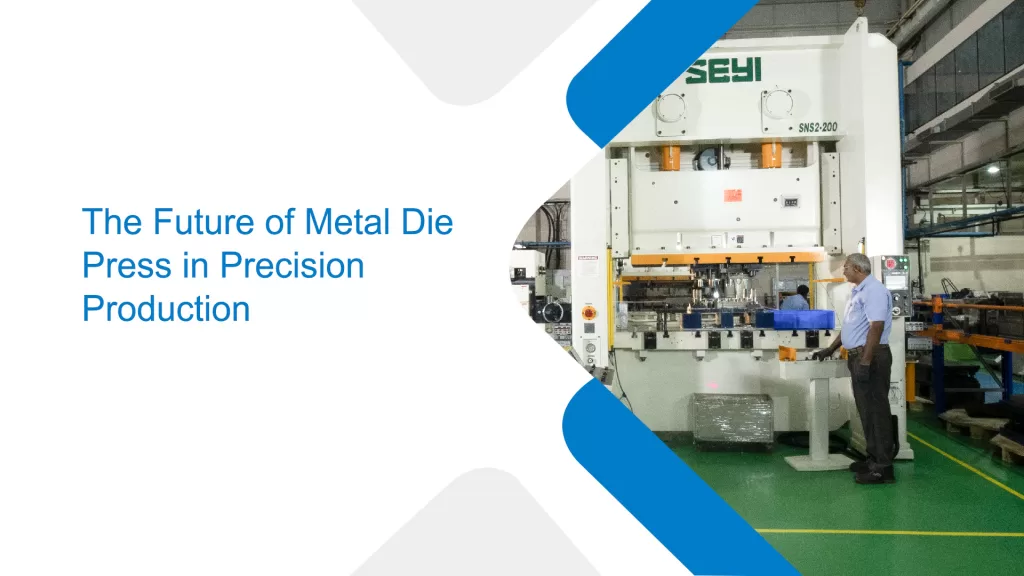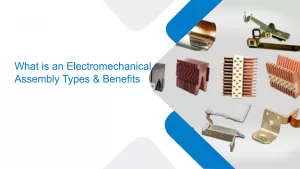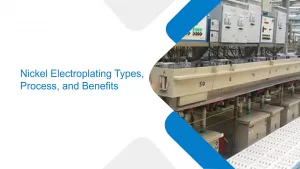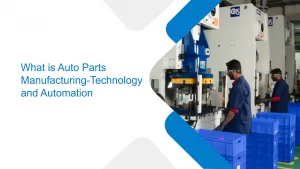The Future of Metal Die Press in Precision Production
- Metal Stamping |
- Nov 11, 2024

Manufacturing’s development has always been strongly linked to technological advances. This is also true for metal die press technology, essential to precise manufacturing. Metal die presses have historically made it possible to accurately and consistently produce complicated metal parts in large quantities.
Future metal die press technology will be driven by automation, materials science, and digital integration. It transforms industries including aerospace, automotive, and consumer electronics. The following are the metal die press’s prospects in precision manufacturing:
Metal Die Press:
Before looking to the future, it is important to comprehend the essential function of metal die presses in contemporary manufacturing. By pushing metal sheets up against a die, a particularly formed tool, a metal die press is a machine that shapes, cuts, and forms metal sheets.
The automotive, aircraft, and electronics sectors have all extensively used this stamping technology to produce a wide range of parts, from simple brackets to complex structural components.
Importance of Metal Die Press in Precision Manufacturing
Metal die press in precision manufacturing has become more popular recently. Here mentioned are the importance of metal die press in precision manufacturing:
Accuracy and Precision
Extreme accuracy is a fundamental need of precision production. Metal die presses precisely shape, cut, and create metal objects using specially-made dies. These presses are essential in industries where even the smallest deviation can fail since they can produce components with tolerances as close as a few microns.
Efficiency
A major benefit of metal die presses is their effectiveness. These devices are perfect for mass manufacturing since they can swiftly and efficiently generate vast numbers of parts. Once the die is made, the press may operate constantly, creating identical components with little downtime. This scalability is essential for businesses like the car manufacturing sector, where thousands of similar parts must be created.
Future of Metal Die Press in Precision Manufacturing
Progress in Materials Science
Materials science advancements will significantly impact future metal die press technology. Composite alloys and lightweight metals are two examples of novel materials gradually displacing more traditional metalworking materials such as steel, aluminum, and copper.
Metal die press machines in precision manufacturing must be more precisely and easily adjusted to accommodate these new materials. Machines must precisely control pressure, temperature, and speed to ensure the appropriate shape of newer, sometimes more sensitive materials. Tooling must also be stronger to withstand high levels of wear from tougher metals.
Manufacturing Hybrids and 3D Printing
Due to its capacity to produce intricate pieces with little waste, additive manufacturing, and 3D printing, it will attract more users. Future manufacturing techniques might include more hybrid approaches, in which items are first shaped by metal die pressing.
Then, intricate geometries, surface textures, and integrated components are added via 3D printing. In sectors where strength and precision are crucial, like aerospace and medical devices, this could lead to new options for part functioning and performance.
Superior Substances and Compounds
Developing advanced materials and alloys will also impact metal die pressing shortly. Presses capable of handling these new materials are becoming increasingly vital as industries such as aerospace and automotive demand stronger, lighter materials.
Metal die presses’ future technology will include presses that can handle a wider range of materials. These presses will be especially beneficial for lightweight applications such as electric vehicles, aviation, and industrial equipment.
Combining AI and Automation
Automation and artificial intelligence are expected to be very important in the future of metal die pressing. The metal die press sector in precision manufacturing is not an exception to the trend of smart factories. During the pressing process, artificial intelligence algorithms can track real-time data and spot variations in force, temperature, or die alignment that might result in faults.
Predictive maintenance guarantees greater accuracy and helps to limit downtime, while automation lowers human error, speeds up production, and improves consistency throughout lengthy production cycles. Machine learning can further advance precision manufacturing processes by analyzing historical production data to refine die designs and pressing techniques.
Personalization and Flexibility
In today’s market, consumers demand more individualized products. Thus, producers are looking for solutions to make personalization possible even in high-volume manufacturing setups. Manufacturers may build unique components with flexible die press systems that can be reconfigured quickly without sacrificing efficiency and quality.
Manufacturers of metal die presses will probably provide more scalable options, enabling businesses to expand or modify their current pressing operations without requiring more equipment. As new technological advancements emerge, this flexibility aids in their integration.
Bottom Line:
Eigen has established itself as a leading global metal die precision manufacturing producer. We have made great progress to reach this point, where we can now provide our clients with specialized solutions. Our areas of expertise are progressive tools for high-speed stamping, prototype tools, plastic injection molds, and electroplating. Get in touch with us for better service.
Ujjwal handles crucial roles like AGM Marketing, researcher, and is an author for KDDL – Eigen. He currently works with Eigen for implementing proven techniques and strategies for marketing plans on online and offline platforms. An expert in efficiently executing SEO, SEM, email marketing, social media marketing, PR marketing, Print campaigns, etc. Ujjwal has coordinated an efficient marketing team on various creative campaigns and programmatic buying to support various digital cross-promotion efforts. Implement efficient search optimization strategies with the help of collateral material and metrics.
In his former years, Ujjwal has years of experience in a managerial role for several reputed companies. His years of experience combined with the flair of writing help him come up with result oriented strategies for Eigen.




